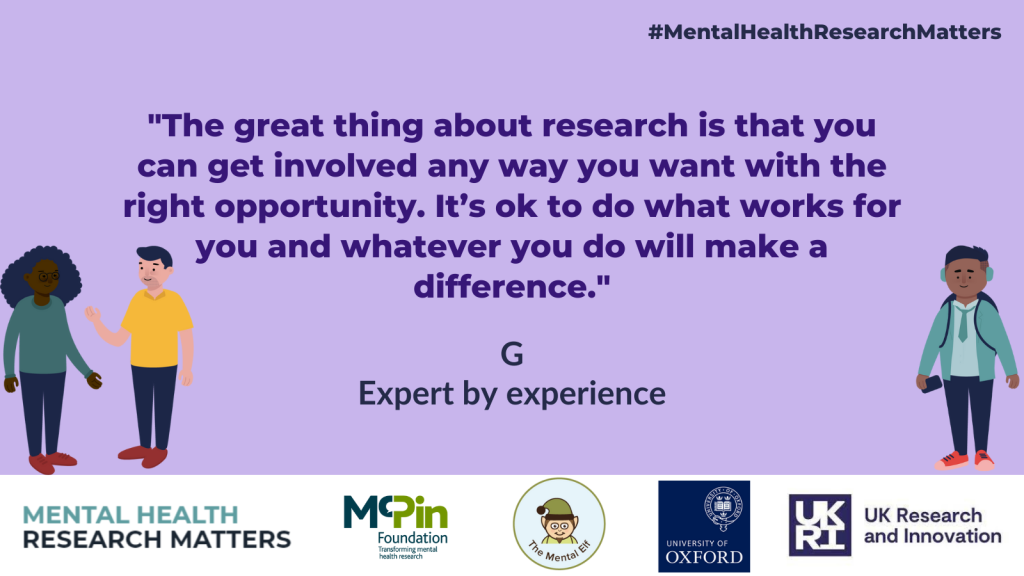G shares how using their personal experience of mental ill-health to shape research opened up new career opportunities, landing them a job at a leading mental health charity. They talk about how they came across lived experience involvement opportunities, what they involved and how G contributed.

I turned my experience of mental ill-health into a career with the help of lived experience research.
I became involved in mental health research when I first became unwell and started experiencing mental health stigma in school from teachers. There wasn’t a big conversation about mental health then, particularly with young people. As well as my own experiences, I also had an interest in psychology, which I eventually studied at university,
Being involved in research completely changed my life.
When I graduated, I was looking to go into research myself, looking for research assistant jobs. That’s how I stumbled across ways to use my personal experiences to shape research. I started with small opportunities, like answering questionnaires or reviewing feedback forms via email. Finding organisations like The McPin Foundation, Loneliness and Social Isolation in Mental Health Research Network and Emerging Minds Network and signing up for their newsletters, really helped me. Through them I found more lived experience involvement opportunities. I kept my eye on different university pages as well.
With time, I started working on bigger projects, such as sharing my thoughts in interviews about topics I had experience of. Researchers would want to just hear my story or let me feedback on what they were working on. It was always light, easy, and friendly. I worked on some bigger projects too, which involved me being a lead on the project . This involved helping lead breakout rooms, and creating resources based on what we were working on
At times I found it challenging as I didn’t have a lot of confidence in myself. But this was a perfect opportunity to learn these skills for the first time in a place that would support me and not expect me to know how to do everything. I went from being someone that would be thanked for giving bits of my experience, to a co-author on a published paper with one of the networks.
I’ve benefited so much from research. I’ve developed important skills for the workplace, like communication and leadership skills. I connected with a network of people that worked in this area, helping me find more opportunities. But my involvement in research gave me so much more than that.
The pandemic hit. I wasn’t working, couldn’t find work, and was too ill to work. Research opportunities gave me things to work on and look forward to, without the pressure of a job. They connected me to people, and they let me turn my experiences into something useful, for myself and other people.
When I left university, I didn’t get a single interview for over 70 jobs I applied for, in everything from research to shop assistant roles. After two years of different voluntary and research experience during the pandemic, I got five job offers in two weeks!
I now work in information for young people at a leading mental health charity, the one I had dreamed of working for when I was younger. Although I am fortunate to have my psychology degree, my work in lived experience research helped me develop key skills to land my current job.
If you’re thinking about getting involved in shaping mental health research, keep thinking about it. You might not feel ready to share things and that’s ok. You don’t have to share everything either, only whatever you’re comfortable with, and it’s ok if that changes. Keep an eye out for opportunities that suit you best and you feel most interested in. If you feel a sense of excitement and motivation but feel nervous, try to go for it! You’re more able than you think. Remember that researchers are learning too, all of us are continuing to learn new things every day.
The great thing about research is that you can get involved any way you want with the right opportunity. Not all of us can take part in big projects due to things like illness, financial constraints, or simply not being comfortable with it. It’s ok to do what works for you and whatever you do will make a difference. Research helped open up and change my world, I hope it does for you too.
Join G and others at the Experts by Experience in #MentalHealthResearchMattters free webinar on Wednesday 16 November.